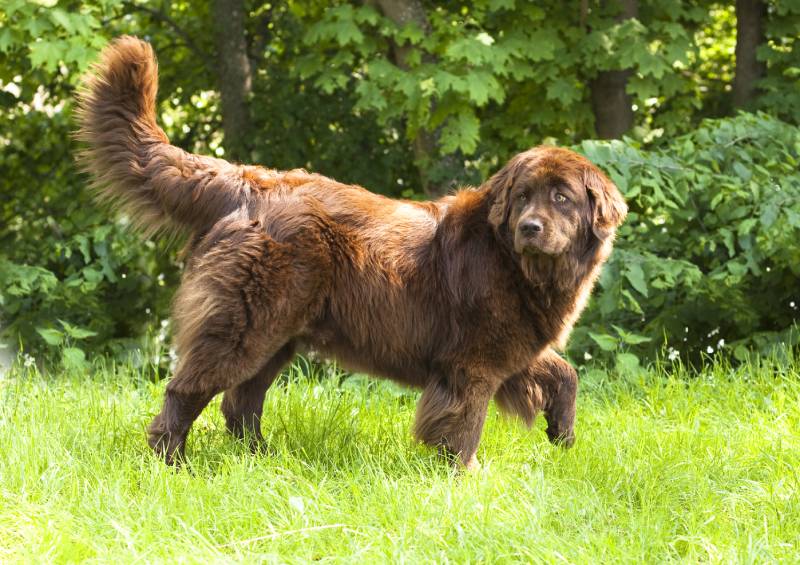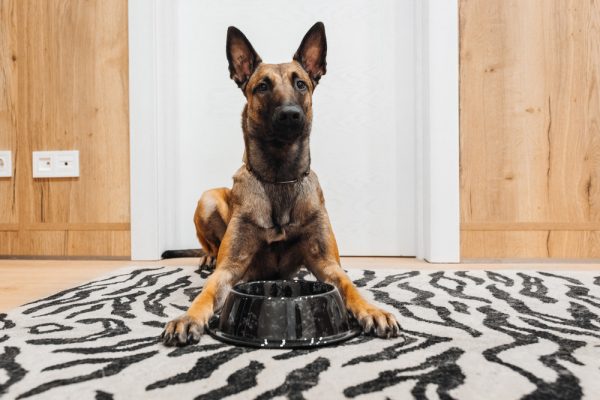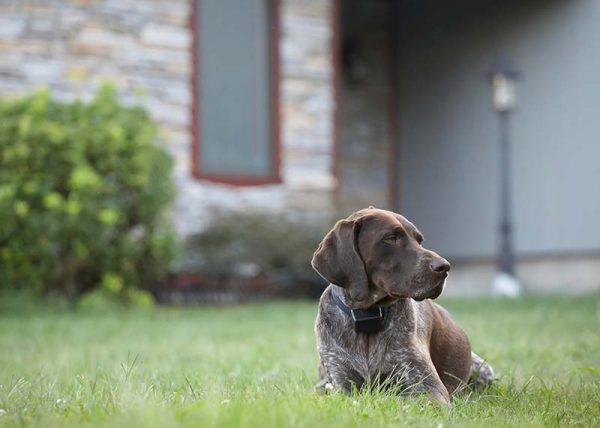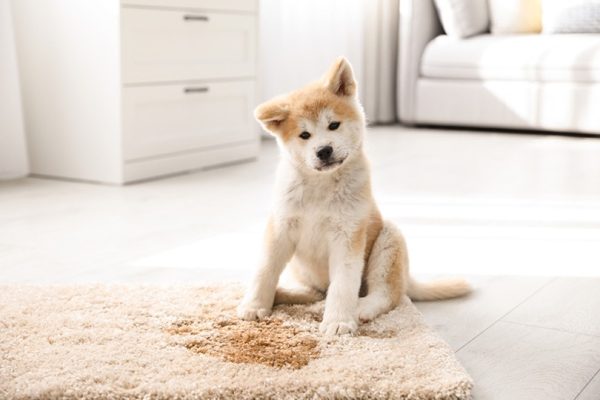In this article
If you’re looking for a new family dog, one of the most critical factors is deciding whether a breed is aggressive. So, if Newfoundlands are on your list of potential pets, you’ll be relieved to find out Newfoundlands are not aggressive. On the contrary, they’re known to be the gentle giants of the canine world and make wonderful rescue and family dogs.
Newfoundlands, also affectionately known as Newfies, are friendly, loving, and great with kids. Like any dog, a Newfie’s behavior depends significantly on training, socialization, and health. So, let’s look closely at Newfies and what you should know if they are exhibiting aggressive behaviors.

Signs of Aggression
Part of knowing why your Newfoundland is being aggressive is first recognizing the signs of aggression; not all signs are as obvious as others. A dog will rarely bite you without first indicating they’re going to attack, so it’s vital that you know what to look for.
- Bark/growl in a threatening way
- Bite lightly (not enough to break the skin)
- Bite hard (to leave a mark or break the skin)
- Curl their lips to show their teeth
- Flatten their ears against the head
- Lunge forward but not make contact
- Make eye contact and hold it
- Snap without making contact
- Snarl
- Stand still with a rigid posture
Depending on what’s caused this reaction, your dog might progress through these behaviors, which means a bite or attack is very close. Also, they might offer a warning by growling or showing you their teeth, but it won’t progress to anything more. Therefore, the source of the aggression is incredibly important because if it’s something you can stop doing or remove, it could de-escalate the situation.


Reasons Your Newfoundland Is Being Aggressive
Figuring out the source of the aggression is an important step, but the next crucial step is figuring out what to do next, and we’ll look at what you should do to help your dog and avoid being hurt in the process.
Protectiveness
Newfoundlands are known to be incredibly protective of their families, so if your dog feels you are under threat from another person or dog, they might show aggression to the source of the danger to keep you safe. If the threat doesn’t retreat, they might attack.
Your dog mustn’t mistake something harmless for a threat and attack the mail carrier who only tries to hand you your mail. So, it’s important to socialize and train your Newfie.
Fear
Fear can quickly become aggressive; when animals are frightened of something, their instinct is to get away from it, known as the flight response. If they cannot do that, they will defend themselves.
You should be careful around a cowering dog because while they start looking fearful, they can attack if you reach for them. Even if you turn to leave, they might lunge and nip at you, so it’s a good idea to avoid showing your back to a scared dog. If your dog is showing fear aggression, they will rapidly bite or nip because the aim is to get away, not necessarily to do the most damage.
You might notice this if your Newfie is a rescue, has been neglected or abused, has been traumatized by a specific event, or has been improperly socialized. Getting information about your dog’s past from where you adopted them could be helpful, but rescued pets sometimes come with unknown histories.
You might need to invest in obedience training with a trainer who has experience working with rescue dogs if training isn’t something you feel you can deal with alone. A veterinarian can also help you find an experienced trainer.

Illness or Injury
If aggression is a new behavior, it could indicate that your dog is feeling unwell. Some medical conditions can make dogs aggressive, and it could be a result of being in pain. Possible causes of pain that could cause aggression are internal injuries, bone fractures, lacerations, tumors, and arthritis.
Conditions such as tumors, cognitive dysfunction, and brain diseases could provoke aggression, and while likely to affect older dogs more, they are still possible in dogs of any age.
Contact a veterinarian if you are worried about your dog’s behavior, especially if it’s new and unexplained. It might be tempting to try and alleviate your dog’s discomfort by giving them pain relief, but you should never do that without advice from a vet, as you could cause more harm.
If you need to speak with a vet but can't get to one, head over to PangoVet. It's our online service where you can talk to a vet online and get the advice you need for your pet — all at an affordable price!

Possessiveness
You might have noticed your Newfie being possessive of toys, food, or something else they value. They might growl if a person or another pet gets too close when eating or playing with a favorite toy. They might even be aggressive to a friend when they visit your home, as your dog sees it as their territory.
Resource gathering will also present as your Newfie snapping, growling, or biting other pets who approach their bed, pick up a favorite toy, or go near their food bowl. To help combat this, you can do things like making their meals fun or trading their toys or the objects they’re possessive of for treats.
You can also do exercises to help with this behavior, which you can do yourself or with an animal behaviorist if you aren’t confident.
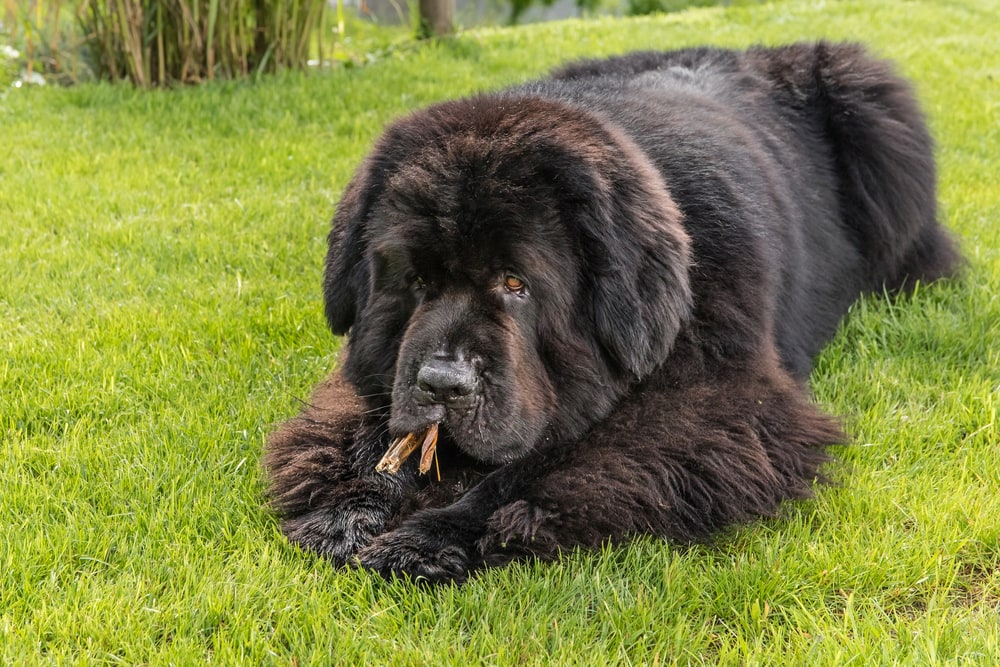
Sex-Related
If your dog hasn’t been spayed or neutered, you might notice they are aggressive, especially if vying for another dog’s attention. Intact males might challenge other male dogs even if there is no female, and fights can break out if there is more than one male living in the same house.
If this happens, it’s generally when the dog is around 1 to 3 years old. Neutering and spaying won’t necessarily eliminate aggression—dogs that have been neutered are still known to fight other dogs. Reproductive status affects your dog’s behavior but isn’t the only factor.
However, testosterone influences their sex drive, the urge to find a mate, and behaviors such as territorial behavior like urine marking. Neutering or spaying will reduce these behaviors.

Are Some Breeds More Aggressive Than Others?
It might seem like a generalization to say Newfoundlands aren’t aggressive, and another breed is. But these assumptions can be made for a few reasons. The dog might have been bred specifically for certain characteristics like protective or guarding tendencies, fighting skills, or hunting prowess.
Even if these dogs aren’t fulfilling their original roles now, they carry their ancestors’ DNA in their genes, meaning a particular breed is more prone to certain types of aggression than another.
However, as we pointed out, these are generalizations. Just because you have a dog prone to aggression doesn’t mean they will be aggressive. Just as having a Newfoundland doesn’t mean your dog can’t become aggressive. There are certain things you can do to ensure your Newfie grows up to be confident, healthy, and well-rounded, such as:
- Socialization: Puppies can be socialized as early as 7 to 8 weeks old.
- Training: Use positive reinforcement, as harsh words and punishment can contribute to aggressive tendencies.
- Seek help early: Don’t wait to seek professional help if you need guidance. Puppies learn best when they’re young during critical developmental periods, and the sooner you address a problem, the easier it will be to resolve.
- Manage encounters: You don’t want to put your puppy in a situation where they are over their head and hurt or attacked by another dog. So be picky about where you take, train, and socialize them and choose dogs that are patient and gentle with puppies to introduce them to.
- Create a safe environment: If your dog feels safe and secure in their home, they are less likely to feel anxious or fearful, which can develop into aggression.
- Pay attention: If you know your dog well, you’ll be aware of changes to their behavior early on. As aggression can be an indication of illness or injury, this is particularly important. Your dog can’t tell you when something is wrong, so it’s up to you to notice.

Conclusion
Newfoundlands aren’t known to be aggressive and have a reputation for being gentle, affectionate, and wonderful family dogs. Behavior is not just inherited; it can be taught. Aggression in dogs can be incredibly dangerous, and the Newfie is a big dog. They typically weigh around 150 pounds and require owners who can handle them. If you are worried about your dog’s behavior or health, speak to your vet and contact a professional dog trainer.
Featured Image Credit: Liliya Kulianionak, Shutterstock
